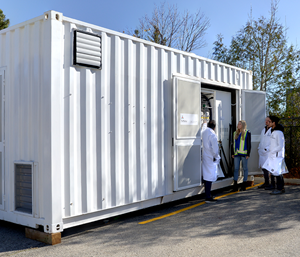News
FuelPositive enters final phase of assembling and validating first farm-ready green ammonia production system
FuelPositive Corporation is issuing the first in a series of updates, news releases and images to share its progress as it enters the final phase of assembling and validating its on-farm, containerized green ammonia production system. Its first full-scale demonstration system will be installed and commissioned on an 11,000-acre crop farm in Manitoba, to run as a pilot project through all types of operating conditions. The system will be used to produce green ammonia to be applied as fertilizer, and eventually as fuel for grain drying and internal combustion engines on the farm.
“As we move closer to the full system delivery of our first full-scale, farm-ready demonstration system, we are excited to share some of the key milestones, as we achieve them,” said Ian Clifford, FuelPositive CEO and Board Chair.
Each component of the system will be tested and commissioned individually before the full system is turned on. The system comprises a nitrogen generator to produce nitrogen from air, a water electrolyzer to produce H2 from water, and a patent-pending ammonia synthesis converter to produce green ammonia from the H2 and nitrogen.
Gas mass spectrometer commissioned and certified
Calibrated to standards set by the National Institute of Standards and Technology, the company’s gas mass spectrometer identifies the exact composition and purity of gases. It is being used to test the composition of the gases at every step of production, with a focus on the H2, nitrogen and ammonia produced by the demonstration system. It accurately identifies and quantifies every gas present in the system, allowing the team to validate the production gases beyond three decimal points of accuracy.
“The commissioning and third-party certification of the gas mass spectrometer completed the build-out of our lab and allowed us to start validating the system’s capabilities. We have already begun the testing process with successful results so far. We are applying this sophisticated and essential piece of equipment to rigorous testing and validation of all the relevant components of the system,” said Nelson Leite, Chief Operating Officer, FuelPositive.
Electrolyzers tested and commissioned
As FuelPositive considers and evaluates various methods and technologies to produce H2 for its systems, two electrolyzer technologies are being utilized to make H2 in the initial demonstration system. Both electrolyzers have now passed factory acceptance testing (FAT), with FAT purity testing of 99.999% pure. FuelPositive has confirmed the H2 purity utilizing its internal certified lab and Bureau Veritas has validated the testing performed by FuelPositive. Bureau Veritas is accredited to ISO/IEC 17025 for specific parameters on scopes of accreditation.
The planned green ammonia production rate the company has set for the system is 300 kg/d or 500 liters/d.
“The purity of the hydrogen directly corresponds to the conversion rate of the ammonia synthesis system and its ability to convert the gases to ammonia. Impure hydrogen would degrade the process over time, reducing the conversion rates and efficiencies. The electrolyzer is the largest contributor to the system’s operating expenses and capital expenses, representing over 80% of the system’s costs. Its efficient operation has the greatest impact to the performance of the overall system. Our team is dedicated to ensuring each system not only performs well initially but performs well over each decade of the system’s life. Our goal is to be the best and to do that, we must perform over the entire life of the system,” said Leite.
Milestones to come
The company will shortly be sequentially and independently validating its patent-pending ammonia synthesis converters. First, the separation rate will be validated, by FuelPositive and independently, then control parameters (pressure and temperature), followed by the conversion rate. Each will be individually reported. As well, the nitrogen system will be independently validated and commissioned at FuelPositive’s site, after having already passed FAT at the supplier’s site, and will be integrated into the system as a complete process. Before it can finally be declared farm-ready, the entire system will be turned on and validated – first by FuelPositive, and then by two independent expert organizations.
Supply chain challenges
“I should point out that supply chain delays continue to challenge our various suppliers. As a result, we now expect that the first system will be farm-ready by the end of December 2022. We have not experienced any technical delays. If we experience further delays, they will be communicated. We understand any delay is not ideal because the demand for our technology is critical and the interest significant. We are pleased to be only minimally slowed down by the global supply chain problems that have affected so many companies and people around the world. This is a tribute to the professionalism of our team. The completion of the system could have been pushed to next summer, but this team has the skills and experience to mitigate extreme delays,” said Leite.


